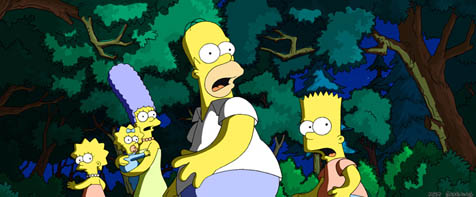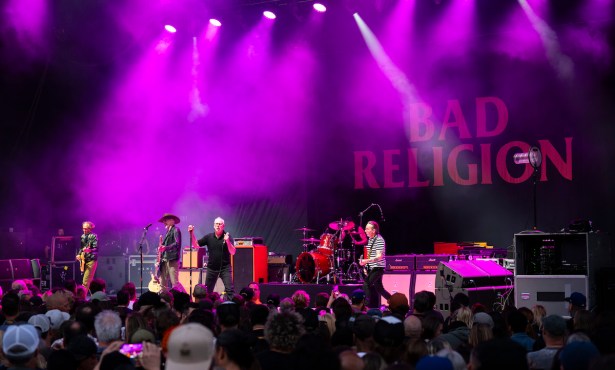Rhapsody in Yellow
My Life with The Simpsons

I remember watching the first-ever episode of The Simpsons. Titled “Simpsons Roasting on an Open Fire,” this Christmas-themed pilot aired December 17, 1989-at a time when I doubt my seven-year-old brain understood most of the jokes or could have anticipated how this bug-eyed, surreally yellow family would figure so largely into my life. I know, I know-it’s The Simpsons, for god’s sake, but here I am making a case for the value of this TV show.
In short, I’m a diehard. I don’t claim to know everything about the show, but I’m unabashedly nerdy, for example, in my ability to name Apu’s niece and nephew. I was one of the first in line to see the The Simpsons Movie, which opened last week. And, if prompted, I’ll talk a person’s ear off about how the plot of the “Kamp Krusty” episode was initially conceived as a possible setup for a Simpsons film back in 1992. And, to me, all this is okay, because I feel this show is important not only in the scheme of pop culture but in full-on, prefix-free culture culture.
This all sounds less schmaltzy if I break it down mathematically. I’ve seen each one of the 400 episodes of The Simpsons. That’s 200 hours. However, the miracle of syndication has allowed me to watch daily reruns-religiously as a teenager, less regularly now. (Though, I must argue, I can’t watch as often now since Santa Barbara’s Fox affiliate, KKFX, swapped out the second Simpsons weekday rerun for considerably worse fare-That ’70s Show, curse you!) I have purchased or have been given each of the show’s nine available DVD sets as well. A conservative estimate puts the total time this writer has spent watching the antics of Homer, Marge, Bart, Lisa, and Maggie at roughly 1,000 hours. Bare minimum, that’s nearly 42 straight days spent in Springfield, a city that’s so far endured floods, riots, fires, a potentially catastrophic comet, a hurricane, former president George Bush, a bear attack, the dreaded Osaka Flu, countless near-nuclear meltdowns, and, yes, the beheading of the statue of its founder.
As the show quips its way toward its 20th anniversary, I realize that even having lived in Santa Barbara for seven years, I’ve still spent more time with the Simpson family than with the majority of the people I know today. That’s scary. Another sobering thought: Thousands of people throughout the world are just like me. We grew up watching Bart pull pranks that pundits once alleged would inspire copycat misbehavior and general mind-mush. And yet many of us devotees graduated college and now have jobs. And we’ll soon be succeeded in this feat by a younger generation that has never known life without The Simpsons. What then, could be the result of all this boob tube quality time? And why has this show managed to make such an indelible mark on me?
I can only answer personally, as I don’t have the means to poll every person whose time watching The Simpsons registers in the quadruple digits. (Nor the interest, honestly, as I fear that group might include far too many people who talk, look, and think like Comic Book Guy, the show’s resident gastropod trash-culture glutton.) But if I had to hazard a guess how The Simpsons came to surpass Ozzie and Harriet as the longest-running American sitcom back in 2004, I’d say the answer lies in the level of comfort the show provides. Though I still watch new episodes if I’m unoccupied at 8 p.m. on a Sunday, I’m the first to admit the jokes don’t fall quite so perfectly from the overbite-afflicted mouths of the show’s characters as they once did. Like many fans, I can even pinpoint when I started to believe the sentiment that the show’s longevity might stem more from the money it rakes in rather than the Fox network’s intent to deliver a quality TV show. Nonetheless, it’s still funny.
Even more importantly, the show feels familiar to me in the way few other things can be just by virtue of its lengthy existence. I hear those nasal Simpsons voices and bam-I’m a kid again, sneaking into a vacant room to watch the show my parents told me not to. Since I moved away from the town where I grew up, I don’t regularly encounter such well-honed memory triggers. But even if I decide I have something better to do on my Sunday night, I’m comforted by the fact that I could have stayed home, watched Homer injure himself in a way that should have killed him, and connected it to a time I saw a similar gag 12 years earlier.
My personal happy place can’t keep a show on the air for two decades, of course, so I suppose the key to The Simpsons‘ staying power lies in its seemingly paradoxical ability to stay timeless while being topical. The members of the Simpson family themselves don’t age, creating chronological puzzlements like Bart being 10 years old when the show began 18 years ago but 15 years younger than me today. However, this anomaly hasn’t prevented the show’s writers from ably taking shots at three U.S. presidents-the only three to exist in my consciousness of political events-and various crises facing the country, with The Simpsons Movie humorously addressing the planet’s looming environmental apocalypse. (Trust me: In 100 years, humankind will either regard the underlying warning as either delightfully quaint or grimly accurate.)
As difficult as it may be for the uninitiated to swallow this notion of The Simpsons-as-culture, it’s just as strange for me to look back on my relationship with the show. In the end, I can’t yet state what the net result of my avid watching might be, aside from a tendency to bond with complete strangers over verbatim recitations of the bits we love. Part of me wants The Simpsons to continue on forever. I’ll probably watch until the end. And from then on, I suppose I’ll have some wonderful memories-shaded, of course, in trademark Simpsons yellow.



